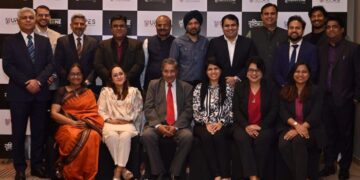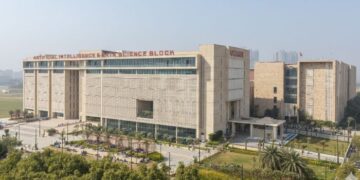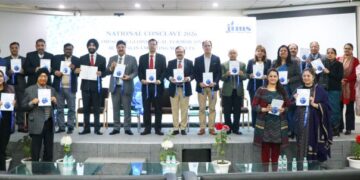In a significant stride towards shaping the vision of a developed India, Jamia Hamdard hosted the esteemed ICSSR Conference on India Towards Viksit Bharat@2047 on Feb 13 in New Delhi which brought together distinguished academicians, policymakers, and thought leaders to deliberate on Inclusive Social Development, with a special focus on Social Security and the Aging Population.
The event aligned with India’s larger vision for 2047 and the Sustainable Development Goals (SDGs), particularly SDG 1 (No Poverty), SDG 3 (Good Health and Well-being), and SDG 10 (Reduce Inequalities)
In his opening remarks, Prof. (Dr.) M. Afshar Alam, Vice Chancellor of Jamia Hamdard, emphasized that true development is not solely an economic milestone but a commitment to social equity. He stressed that a Viksit Bharat will be measured by the security and dignity it offers to its vulnerable populations, including the elderly. He called for collaboration between government agencies, NGOs, and academic institutions to build sustainable policies that leave no citizen behind.
Prof. (Dr.) Reshma Nasreen, the driving force behind the conference, elaborated on the necessity of strengthening social security frameworks to support India’s rapidly aging demographic. She highlighted the significance of financial security, accessible healthcare, and mental well-being in ensuring a dignified life for senior citizens. Addressing the plight of the elderly in marginalized communities and urban slums, she stressed that India’s journey toward 2047 must be inclusive, ensuring that the elderly are not just beneficiaries but active participants in society.
The conference featured an esteemed lineup of speakers, including Prof. A. Venkat Raman (Dean, FMS, University of Delhi), Dr. Ritu Rana (Mission Head, Healthcare, HelpAge India), Dr. Prachi Kaul (Director, Shastri Indo-Canadian Institute), and keynote speaker Prof. (Dr.) Syed Ahsan Jamil (Deputy Vice-Chancellor, Dhofar University, Oman). These experts provided insights into global best practices, emphasizing the need for a rights-based approach to elderly care that ensures financial independence and access to quality healthcare.
Throughout the day, rigorous discussions took place in multiple technical sessions covering key themes such as social security and financial inclusion, healthcare and well-being, policy and governance, and community-based social support. Researchers presented groundbreaking studies on AI-driven healthcare solutions for aging populations, elderly-friendly urban planning, financial resilience among elderly women, and NGO-led community support initiatives. The research shared at the conference is expected to inform and strengthen future policy recommendations aimed at improving the social and financial well-being of India’s elderly.
The event served as a pivotal platform to drive forward the national agenda on social development. The deliberations reinforced the idea that building a Viksit Bharat requires a comprehensive and inclusive approach, where elderly citizens are not seen as a challenge but as valuable contributors to society. The conference concluded with a strong call to action: that research must translate into policy, and policy must translate into tangible change for the millions of elderly Indians who deserve security, dignity, and prosperity.
Reflecting on the conference’s impact, Prof. Afshar Alam reiterated the importance of turning discussions into concrete strategies. “This conference has successfully laid the foundation for a comprehensive roadmap to 2047. Now, we must ensure that the insights and recommendations made here are transformed into policies that create an inclusive and developed India.”
As India marches toward its centennial independence celebration, Jamia Hamdard’s initiative in organizing this conference underscores its commitment to shaping a future that is not only economically prosperous but also socially equitable, ensuring that no one is left behind.













